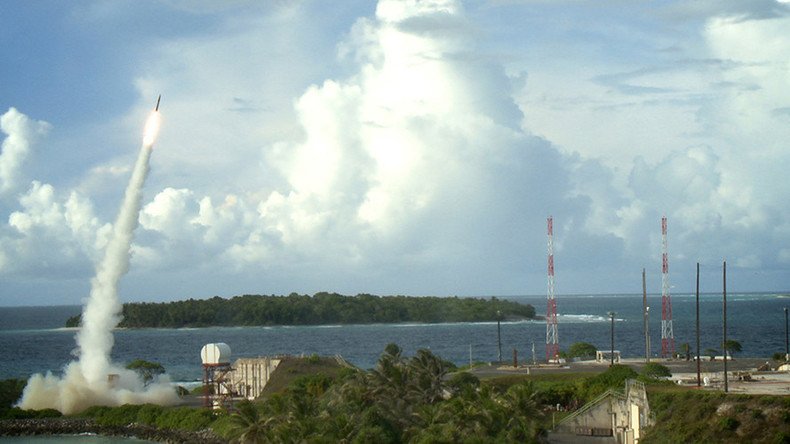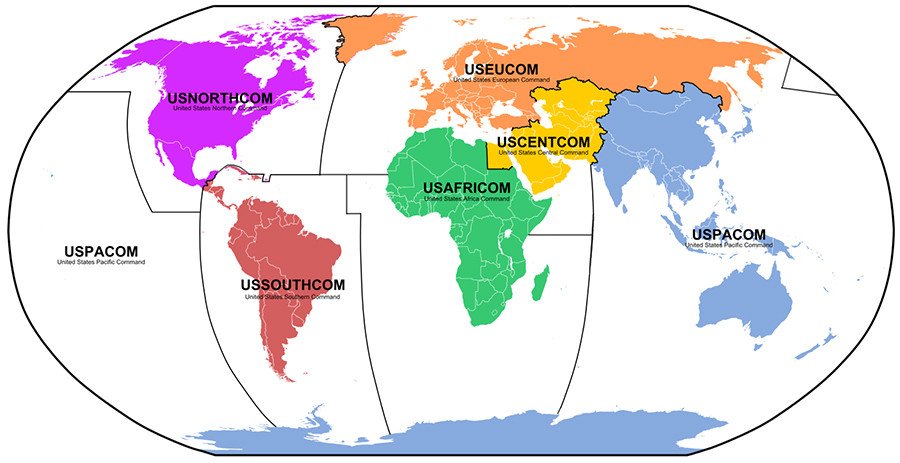Money, missiles & Guantanamo: Senate hears from US admirals

Commanders of US forces in the Americas told the Senate they needed more funding to counter threats from Iran, North Korea and Russia – which they admitted were hypothetical – while praising the “humane” conduct of US troops at “thankless” Guantanamo.
Admiral Kurt W. Tidd, head of US Southern Command (SOUTHCOM), Admiral William E. Gortney, head of US Northern Command (NORTHCOM), and Admiral Cecil E. D. Haney, head of US Strategic Command (STRATCOM), testified on Thursday before the Senate Armed Services Committee, continuing the series of hearings related to the budget demands and strategic plans of the US armed forces in 2017.
READ MORE: US generals to lawmakers: Libya a failed state, Iran a long-term threat
NORTHCOM’s area of responsibility covers the US, Canada, Mexico and the Arctic, and includes the North American Aerospace Defense Command (NORAD). SOUTHCOM covers Latin America south of Mexico, including the Joint Task Force Guantanamo (JTF-GTMO) detention facility in Cuba. Previously known as the Strategic Air Command, STRATCOM is in charge of nuclear weapons, missile defense, space operations and information warfare.
Thankless in Guantanamo
“We continue to conduct safe, humane, legal, and transparent care and custody of the remaining detainees” at Guantanamo Bay, Tidd told the lawmakers. “Detention operations are a demanding, sensitive, and often thankless mission. The medical and guard force deal with enormous stress and are subject to near-constant verbal and physical assaults by 11 detainees.”
“The men and women at JTF-GTMO conduct the most humane, principled detention operations anywhere in the world, often exceeding the requirements of US laws and the Geneva Convention,” he added.
#AdmTidd: @JTFGTMO conducts detention mission “with honor & the utmost discipline, professionalism, and integrity” pic.twitter.com/89xk2sU2dN
— US Southern Command (@southcomwatch) March 10, 2016
'Very expensive’ missiles
The US remains on track to deploy 14 additional interceptor missiles to the array in Alaska, NORTHCOM's Gortney testified, bringing the system up to full strength of 44 missiles by the end of 2017. He noted, however, that the current ballistic defense system has “an unsustainable cost model, which has us postured to shoot down inexpensive rockets with very expensive ones.”
The Missile Defense Agency is working on new technology that would use “non-kinetic methods to defeat ballistic missiles threats when we receive indications that a launch is imminent,” the admiral said. He gave no other details about the program other than that it would be more cost-effective than the current approach.
On the other hand, Gortney defended the controversial aerostat program known as the JLENS – a massive airship moored in Maryland that was supposed to scan for low-level targets over the National Capital Region (NCR). The blimp broke loose last October, wreaking havoc across Maryland and Pennsylvania as it dragged its mooring cable along the ground. The fiasco was later blamed on negligence to replace batteries in an important system component.
“Although this was a setback to our operational exercise, we still believe the JLENS system shows great promise in defense of the NCR,” Gortney argued.
North Korea's new nukes
North Korea also came up at the hearing because of the new mobile intercontinental ballistic missile (ICBM) reportedly being developed by Pyongyang. While the KN08 missile has not yet been tested, US military models suggest it could deliver a nuclear warhead to “much of the continental US,” Gortney said.
“The [North Korean] regime’s efforts to develop and deploy the road-mobile KN08 ICBM have profound implications for homeland missile defense, primarily because the missile obviates most of the pre-launch indicators on which we have traditionally relied to posture our defenses,” he told lawmakers, before adding, “We assess Kim Jong Un is unlikely to attack our Homeland unless he perceives an imminent threat to his regime's survival.”

Shield, or sword?
Citing missile threats by North Korea and Iran, Haney of STRATCOM updated the Senate on the progress of the European Phased Adaptive Approach (EPAA), a missile defense project the US is developing in Poland. The second phase of the project should be operational this spring, and the final phase is on schedule for 2018, he said.
Moscow has criticized the project as targeting Russia, merely using North Korea and Iran as an excuse. Haney described the system as being aimed against “medium- and intermediate-range threats.”
Earlier in the hearing, Gortney said that Russia sought to avoid a strategic conflict with the US.
“Moscow perceives itself to be threatened by a coordinated Western effort to erode its sovereignty, weaken its economy, and undermine its regime. I am concerned these threat perceptions could prompt Russia’s leaders to misinterpret our intentions in a crisis, leading to inadvertent escalation.” he said.
Beware of Bear
Committee Chairman John McCain (R-Arizona) tried to set the tone of the session by telling the admirals at the very beginning that “Russia, then, is your near-term challenge.”
Haney pointed out that, despite the assertions by some officials that the US and Russia are in a nuclear arms race of some kind, “there is continued adherence to the New Strategic Arms Reduction Treaty (New START) by both nations.”
He did, however, cite Russia’s investments in modernizing its nuclear arsenal to tell the senators that “our nuclear weapons (now averaging 27 years of service) and supporting infrastructure (some of which date back to the Manhattan Project) are in dire need of modernization and life extension.”
NORTHCOM CDR, ADM Gortney, giving testimony to #SASC today. pic.twitter.com/kTWcikhcQ7
— NORAD & USNORTHCOM (@NoradNorthcom) March 10, 2016
Tidd joined in, arguing that “Russian officials’ rhetoric, high-level political visits, and military-security engagements are designed to displace the United States as the partner of choice in the region.”
The SOUTHCOM chief characterized Latin America as “a beacon of hope, peace, prosperity, and partnership” in an increasingly chaotic and insecure world, accusing Russia of using media “to create doubts about US intentions and criticize US policies.”
Gortney was more nuanced in his assessment. The NORTHCOM head reminded the panel of the incident on July 4 last year, when two sets of Russian Tu-95 ‘Bear’ long-range bombers were spotted off the coasts of California and Alaska.
“Although none of the four bombers entered US or Canadian sovereign airspace and were not a direct threat to our national security, they do represent a strategic demonstration of Russian military capability,” Gortney said.
“Russia’s strategic nuclear forces remain the only foreign military threat that could imperil our nation’s existence,” the NORTHCOM chief warned.












